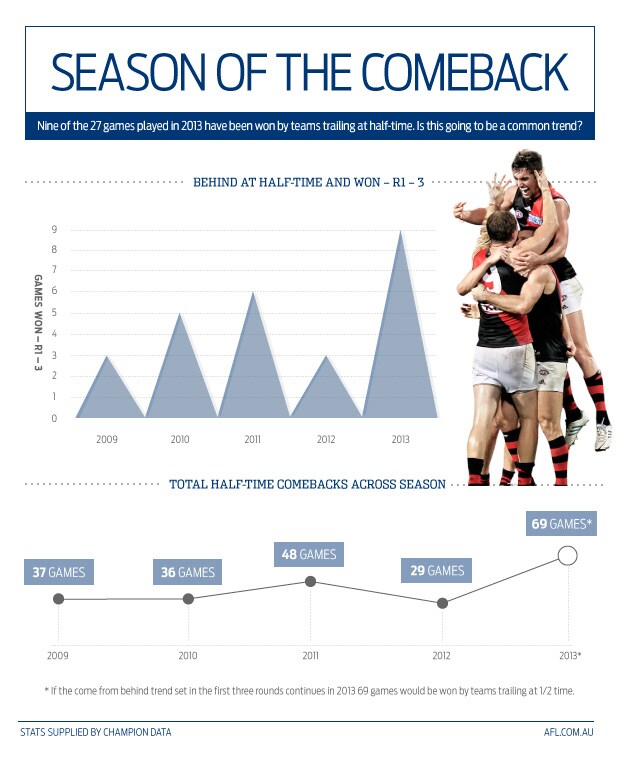That statistic is threatening to turn this season into the year of the comeback.
If things keep tracking at the same rate, the number of games won by teams trailing at half-time would be 69 by season's end.
Teams are aware of the trend too.
Hawthorn's inspirational skipper Luke Hodge said as much after the Hawks dragged back a deficit late in the second quarter to be within one point of Collingwood at half-time on Sunday.
"You've seen even early on this year teams have been a long way behind, but as long as you stick to your guns, keep working hard and doing the right things, you're always going to get opportunities to come back," Hodge said.
On Sunday the Hawks kicked 15 goals to six after half-time to defeat the Magpies.
Of course a one-point deficit is neither here nor there but Essendon's six-goal turnaround on Friday night against Fremantle was equal 25th on the list of all-time 'come from behind at half-time wins' in terms of margin.
The biggest was in 1970 when Collingwood came back from 52 points behind at half-time against St Kilda to win by seven points.
It was also the fourth biggest margin the Bombers have overcome at half-time in its history. The biggest was in 1992 when it came from 45 points behind to defeat Melbourne at the MCG (no, James Hird was not in that team but Mark Thompson was).
Geelong overcame a 35-point half-time deficit against North Melbourne in round two to fall over the line in the final minute (that was the equal third biggest half-time margin the Cats have overcome).
The Cats also trailed the Hawks by 20 points in round one before winning.
Gold Coast, Collingwood, Fremantle, Port Adelaide and Sydney have also won in 2013 after trailing at half-time.
North Melbourne is the only team to have been on the receiving end twice.
The common denominator in eight of those nine successful comebacks so far this year has been that the team charging home has kicked the first goal after half-time.
One factor that might be contributing to the sudden spike is the use of the substitute.
Mathew Stokes dragged Geelong back into the match against the Kangaroos with 16 possessions in round two after coming on to the ground during the third quarter.
On Friday night, the Bombers' Travis Colyer provided life around the packs after key defender Dustin Fletcher was subbed off midway through the third quarter.
Fremantle had already been forced to use its sub when Luke McPharlin was concussed after a clash with Patrick Ryder in the first five minutes.
Colyer picked up 11 disposals in the come-from-behind win.
Kane Mitchell had 12 touches after half-time for Port Adelaide against the Crows while the Suns' Brandon Matera was instrumental in their win over St Kilda in round one.
Clubs are happy to introduce players to turn the tide, hitting the emergency lever rather than hold back the sub as protection from an injury.
The Cats are one club more likely to be focused on getting a good start then celebrating its ability to charge home.
It knows from the experience of losing to Fremantle in the first week of the finals last season how some leads can't be overcome no matter how hard you try.
It will also remember how costly its poor start against the Sydney Swans was in 2012 when it trailed by 35 points at quarter-time and then 29 points at half-time before losing by a goal. On that night it subbed off Dawson Simpson and brought on Allen Christensen and the game turned.
Geelong plays the Sydney Swans at the SCG this week.
Everyone in football knows the old racing adage that frontrunners win more often than sweepers. It's better to be ahead at the long break.
But as the game appears to be changing it's not as bad to be behind at half-time as it once was.



